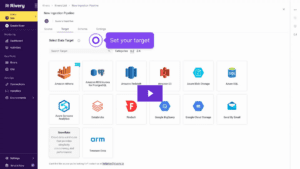From customer insights, to behavioral metrics, to lead attribution, data determines the scope and success of all marketing initiatives.
However, marketing teams often manage many different data sources and high volumes of data. This can create data silos that reduce efficiency, accuracy, and ultimately, revenue.
That’s why some marketing teams have turned to cloud data warehouses to unlock the full potential of their data.
Cloud data warehouses are intuitive and broadly accessible platforms that marketers are increasingly using to centralize, format, and analyze all of their data, in one place.
Here’s an overview of what cloud data warehouses offer marketing teams, including 5 unique benefits.
Why are Marketing Teams Adopting Cloud Data Warehouses?
Cloud data warehouses solve a problem that all marketing teams must contend with: data centralization.
Even small marketing teams, located in a single office, struggle to produce a shared, real-time database of all marketing data. And for large teams, staffed in offices across the world, this task is even harder.
Why is that?
There are two problems marketing teams must contend with.
The first part is the vast number of data sources marketing teams use. Marketing teams pull data from their own platforms, such as Hubspot, but also from those of other departments, such Shopify or Salesforce. Marketers can also pull data from internal sources, such as on-premise sales systems running on Netsuite.
The second part is the massive volume of data that marketing teams collect. Marketers capture everything from Facebook likes, to time spent on a product page, to clicks on a Google Ad. This data is often used for individual marketing initiatives, but is rarely combined into a single database. And if it is, the database is frequently not scalable enough to handle all the data as it grows.
Cloud data warehouses solve both of these problems.
A cloud data warehouse can ingest and collate all data sources, internal or external, on-premise or web-based, structured or unstructured, no matter how disparate or diverse the data is.
And with infinite processing capabilities, a cloud data warehouse can scale quickly and store the high volume of data that a marketing team generates.
These reasons, combined with the ease-of-use factor, make cloud data warehouses a smart solution for marketing teams to centralize their data sources.
5 Benefits Cloud Data Warehouses Unlock for Marketing Teams
1. Single Source of Truth
A cloud data warehouse creates a “single source of truth” that the entire marketing department can operate from.
The cloud data warehouse shares the exact same data with all the marketers in a department, standardizing the data for all campaigns and initiatives. By accessing a single, constantly-updated database, the marketing team can execute initiatives faster, more efficiently, and more synchronously.
2. Sharper Insights
One of the thorniest challenges in marketing is tracking performance metrics and advanced analytics, such as ROI, lead attribution, and customer acquisition costs.
Marketing teams that operate without a central database often rely on scattered data and spreadsheet math to calculate these important metrics.
But a cloud data warehouse enables marketing teams to generate more granular insights by unlocking the full depth and diversity of their data.
By breaking down data silos, combining internal and external data sources, and presenting all marketing data side-by-side, a cloud data warehouse allows marketers to mix and match the most relevant and incisive data points for unprecedented insights.
3. Real-Time Data
Some marketing teams do use centralized databases. But many times, the data is not reported in real-time.
This forces marketers to operate with out-of-date information. This data gap makes targeting prospects within optimal conversion windows harder. A cloud data warehouse, on the other hand, has the capacity to ingest data in real-time.
Marketers can build their campaigns around the best and most timely data, leading to more leads, business opportunities, and customers.
4. Operational Efficiency
With so many competing data sources, from CRM, to social, to web analytics, marketers often waste time manually gathering data for individual campaigns. This inexact methodology also runs the risk of producing incomplete or inaccurate data sets.
But with a cloud data warehouse, marketing teams can eliminate the long, arduous, and imprecise task of searching for data across a multitude of platforms.
A cloud data warehouse puts all marketing data right at a marketer’s fingertips. This improves operational efficiency, allowing marketers to focus on more important tasks, while also enabling marketing campaigns and initiatives to execute faster.
5. Universal Accessibility
Cloud data warehouses enable marketing teams to access data wherever and whenever they want to.
With a cloud-based infrastructure, these platforms empower teams in different offices, locations, and time zones to access, analyze, and operationalize the same uniform, comprehensive marketing data.
For today’s diverse, global marketing departments, cloud data warehouses offer standardized access to marketing data for all team members, anytime and anywhere.
Cloud Data Warehouse: What Are the Next Steps for a Marketing Team?
Cloud data warehouses offer exciting new advantages to data-driven marketing teams.
If a marketing team does decide to adopt a cloud data warehouse, it must also consider additional tech infrastructure. Most cloud data warehouses do not offer native data integration capabilities.
That’s why teams will need a data integration platform. These data integration platforms actually connect marketing data sources to a cloud data warehouse.
To find out more about data integration platforms, read our recent eBook to learn everything you need to know about the topic.
Minimize the firefighting. Maximize ROI on pipelines.





